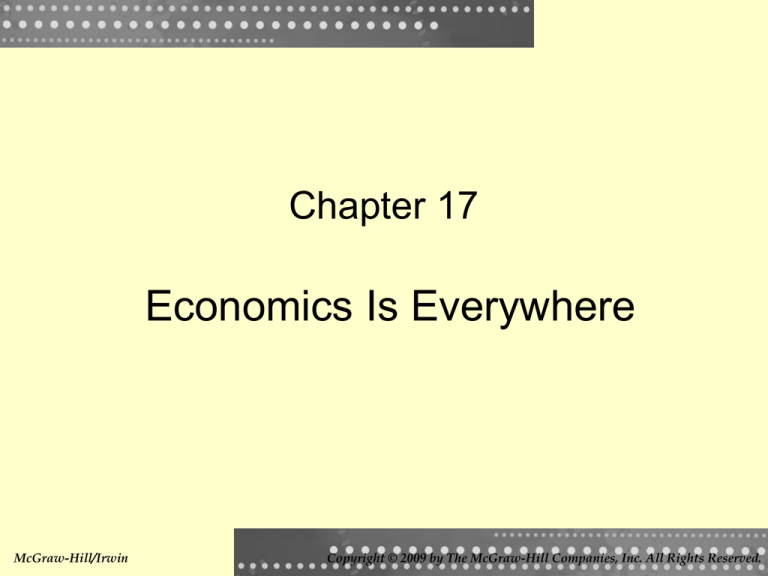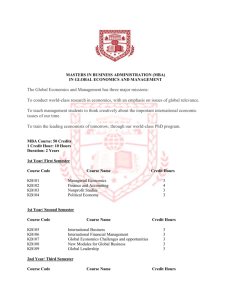
Chapter 17
Economics Is Everywhere
McGraw-Hill/Irwin
Copyright © 2009 by The McGraw-Hill Companies, Inc. All Rights Reserved.
Learning Objectives
• How does Adam Smith’s invisible hand improve
technology?
• What is technological utopia?
• What will happen with the artificial enhancement of
human intelligence?
• How can we use the invisible hand to strengthen airport
security, rehabilitate ex-cons, to catch outlaws, to
improve schools, to fulfill quest for knowledge?
• What is economics of crime?
• Why do we give non-monetary gifts?
• How does the stock market work?
• How does education provide signal?
2
17-2
Markets’ Potential
• Markets have unlimited potential.
• Firms, in the selfish quest for profits, keep
pushing the technological frontier forward.
• Adam Smith’s invisible hand constantly
pushes companies to find better ways of
satisfying customers.
• Markets coordinate people’s efforts to
create products of continually improving
value.
3
17-3
Technological Utopia
• A technological utopia might push us past
all the limits humanity currently faces.
• Economics is essentially about decisionmaking when resources are limited and
individuals are forced to make tradeoffs.
• It might, therefore, make economics as we
know it today obsolete.
4
17-4
Technological Utopia by 2050
•
•
•
•
•
Assumptions:
Moore’s Law, i.e. the computing power one can buy for
$1,000 doubles every year, will continue to hold at
least until 2050.
In 2030 a $1,000 personal computer will be as fast as
a human brain.
In 2050 we will have computer software that simulates
human intelligence.
So, in 2050 we will have one billion computerscientists that think a million times faster than human
scientists.
They would almost certainly figure out how to cure
death and give us wealth beyond our imagining.
5
17-5
Enhancing Human Intelligence
• Intelligence drives innovation.
• In the near future we humans may artificially
boost our intelligence.
• Widespread use of intelligence enhancing drugs
could add trillions to the world economy.
• Workers would take the drugs only if the extra
pay was worth the increased health risks.
• Countries will find it extremely costly to ban the
use of intelligence enhancers.
6
17-6
Using Invisible Hand
•
•
•
•
Strengthening airport security:
Ordinary citizens should be given the chance to
act as fake terrorists.
The salaries of airport security workers should be
tied to how well they do against the fake terrorists.
Rehabilitating ex-cons:
Private firms rather than government parole
officers should be in charge of ex-cons’
rehabilitation.
These private firms should be rewarded if they
succeed in rehabilitating ex-cons, but punished if
they fail to reform them.
7
17-7
Using Invisible Hand
•
•
•
•
A billion for Bin Laden:
$25 million reward offered by the U.S. is not
enough to attract professional firms to hunt Osama
Bin Laden.
A $1 billion bounty for Bin Laden will allow the U.S.
to enlist the efficiency and creativity of the free
market.
School choice:
School choice forces public schools to compete for
students.
School choice makes it in the self-interest of public
schools to satisfy their customers.
8
17-8
Using Invisible Hand
•
•
Prizes:
Through offering a prize, one could cause
the invisible hand to motivate people to
accomplish nearly anything.
Curing cancer with auction:
The medical team that bids the most
would be the one most confident in its
ability to find a cure for cancer.
9
17-9
Economics is Everywhere
•
•
•
•
Economics of crime:
A criminal chooses crime because the benefits to him
of criminality exceed the cost.
For society, crime differs from most other professions
because it destroys rather than creates wealth.
Marginal deterrence is one reason why we shouldn’t
kill all criminals.
Most property and violent crimes committed by poor
people as they face lower opportunity costs and
careers costs of crime and going to prison.
10
17-10
Economics is Everywhere
•
•
•
•
Gift giving:
Economists believe that people seek to maximize their
own pleasure. Most humans seem to receive pleasure
from giving to those they care about.
Some economists believe that giving a non-monetary
gift sends a signal of understanding and empathy for
the recipient.
Some economists believe that a stigma associated
with buying certain luxury items for oneself explains
some non-monetary gifting behavior.
Other economists think that people might not give cash
gifts precisely because cash is so valuable.
11
17-11
Economics is Everywhere
•
•
•
•
The stock market:
Companies issue stock to raise money.
When one buys stock in a company, one owns
part of that company and is entitled to some of
its future profits.
The value of a company’s stock is determined
by estimates of these profits.
Economists believe that stock investors should
hold diversified portfolios, i.e. invest in many
types of stocks. Diversifying lowers risk without
lowering average gains.
12
17-12
Economics is Everywhere
•
•
•
Education and signaling:
Signaling occurs when someone tries to show
others that he has some desirable hidden trait
such as intelligence.
A signaling theory about college shows that
college could increase a student’s earning
capacity even if it teaches him nothing of
value, e.g. The Ford Modeling agency.
Economists disagree over the validity of the
signaling theory.
13
17-13
Do You Know?
• Why does the invisible hand not motivate public
schools?
Public schools do not have economic incentive to do
well. They are neither rewarded for good work nor
punished for failure.
• How does opportunity cost partially explain why the poor
commit more crimes than the rich and middle class?
Part of the cost of going to prison is the difference in
happiness one receives between living in the current
residence and living in jail. As poor people do not have
good living conditions and high paying jobs, their
opportunity cost of going to jail is lower than the rich and
middle class.
14
17-14
Do You Know?
• What does it mean to hold a diversified portfolio?
Having a diversified portfolio means investing in many
types of stocks. Diversifying lowers your risk without
lowering your average gains. To fully diversify investors
should buy stocks in foreign companies.
• Why, unlike steroids, would widespread use of
intelligence-enhancing drugs benefit humanity?
Sports fans care about the relative performance of
athletes. But outside of sports, it’s absolute not relative
performance that counts. If, for example, intelligence
enhancers improved the skills of all cancer researchers,
software engineers and teachers then society would
indeed benefit greatly.
15
17-15
Summary
• Adam Smith’s invisible hand constantly pushes the
technological frontier forward.
• Widespread use of intelligence enhancing drugs could
add trillions to the world economy.
• In a technological utopia computer-scientists almost
certainly figure out how give us wealth beyond our
imagining.
• A technological utopia make economics as we know it
today obsolete.
• Invisible hand and markets can be used to strengthen
airport security, rehabilitate ex-cons, to catch outlaws, to
improve schools and to fulfill quest for knowledge.
• Economic analysis can be applied to crime, gift giving,
the stock market and education.
16
17-16





